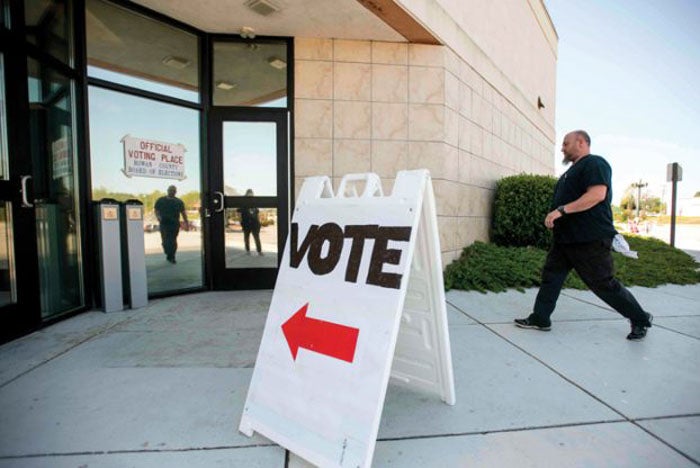Editorial: Independent redistricting commission could solve gerrymandering issue
Published 12:00 am Sunday, June 30, 2019

- Salisbury Post File photo - a voter walks into the Rowan County Board of Elections during early voting in 2018.
“If left unchecked, gerrymanders like the ones here may irreparably damage our system of government,” wrote U.S. Supreme Court Justice Elena Kagan in the dissent to last week’s ruling that partisan gerrymandering is beyond the jurisdiction of the federal court.
And, in fact, the 5-4 ruling issued in gerrymandering cases from North Carolina and Maryland does exactly that — leaves gerrymanders unchecked. Roberts, himself, called the districts “highly partisan, by any measure.” The court acknowledged districts in N.C. were drawn with partisan gain as the goal but decided it shouldn’t step in to rectify the issue.
Throughout the court’s opinion, Roberts repeatedly asked how much is too much? How much of a decline in voter engagement represented a First Amendment burden created by partisan gerrymandering, Roberts asked. At what point would a court’s efforts to ensure representative maps turn into an overreach of judicial authority?
However, there’s a clear imbalance in our state between the way congressional districts are drawn and the statewide vote breakdown in congressional elections. More N.C. voters picked a Democratic congressional candidate in 2018 — 1.63 million — than a Republican — 1.52 million. But nine Republicans and three Democrats comprise our congressional delegation (one district is undecided after fraud allegations). And North Carolina is far from a 9-3 state. N.C. chose a Republican for president and a Democrat for governor in 2016. In 2012, the state went Republican in both races and in 2008 N.C. chose a Democrat for president and governor.
Republicans recognize that districts in North Carolina are drawn to provide partisan advantage to the party. It’s part of the norm, Sen. Carl Ford told Post reporter Liz Moomey in a story published on Page 1A today.
But it should not be — not here, and not anywhere. Neither conservatives nor liberals should be satisfied with the argument that “the other party did it, too.” A future redistricting might well put the GOP in the same situation Maryland Republicans face.
To be clear, neither courts nor state legislators should not seek to create a 5-5 split between the two major parties. To any reasonable person, that’s a clear example of judicial or legislative overreach. Instead, North Carolina should, at long last, create an independent redistricting commission. Resulting districts would not be perfect, but they would surely be better than districts produced by legislators who openly state that the map didn’t contain more firmly Republican districts because it was not possible.
A bill proposed by Rep. Harry Warren, the N.C. FAIR State and Congressional Districts Act, is a good place to start to end partisan gerrymandering once and for all. Despite its bipartisan support and reasonable solution — giving the majority and minority parties the right to choose members — it has languished in the Committee on Redistricting since its April introduction.
Sure, as Chief Justice Roberts said in the majority opinion, partisan gerrymandering is nothing new.
“The practice was known in the colonies prior to independence, and the framers were familiar with it at the time of drafting and ratification of the Constitution,” Roberts wrote.
But partisan gerrymandering only furthers polarization — decidedly bad for public discourse.
North Carolina likely isn’t done with court battles over partisan gerrymandering — the Supreme Court effectively encouraged a challenge in state court — but we can avoid them by creating an independent redistricting commission, an easy solution that prevents district lines from falling victim to partisan whims and already has bipartisan support.


